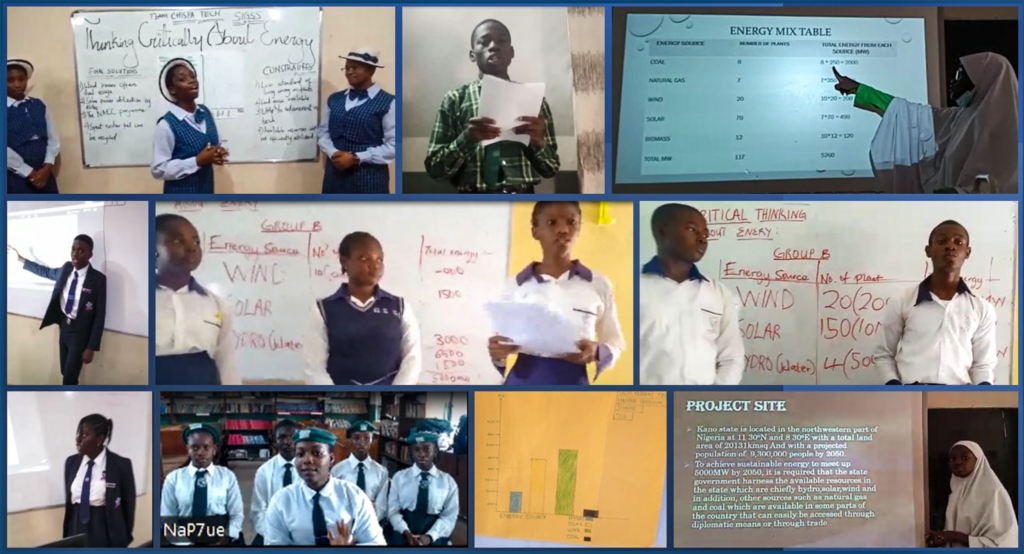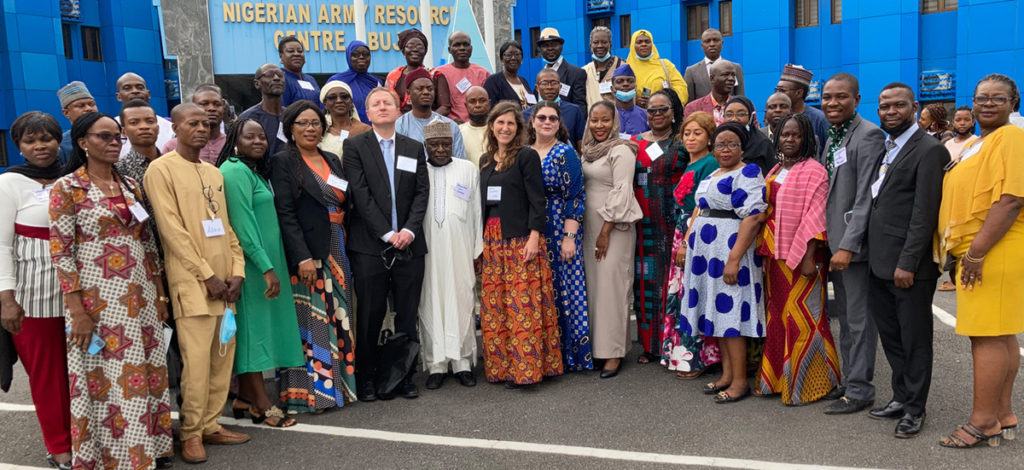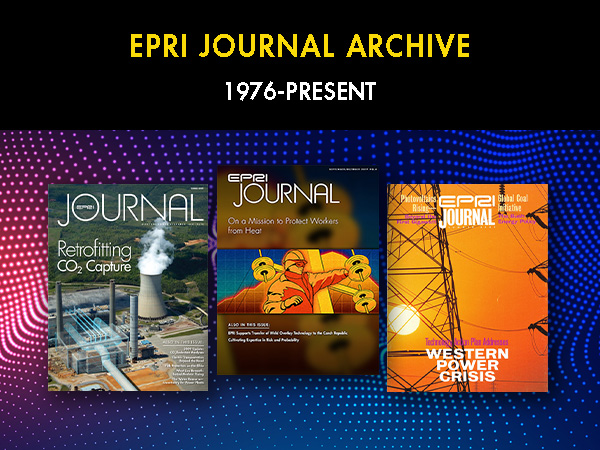How EPRI volunteers are helping prepare future leaders to make complex energy decisions
With the sound of honking cars in the background, a progression of Nigerian students explained to the camera how they believe the city of Kano can develop a reliable electricity supply by 2050.
Their presentation’s title, “Energy Is Life,” is more an aspiration than a reality in Nigeria. Indeed, according to the World Bank, 43 percent of Nigeria’s 217 million people lack access to grid electricity. The students are clear-eyed about some of the challenges they face in devising an electrification strategy for Kano. According to them, these include a lack of water, wildfire risk, and a generally poor local economy. Further, while access to energy is sketchy today, the need for electricity will only grow as Kano’s population of 4.3 million more than doubles by 2050.
But the students who appeared in the video have put a lot of thought into these challenges and have come up with solutions to deliver the steady supply of electricity that all thriving economies and societies require. The students’ 2050 plan for Kano includes a mix of several energy sources, balancing availability and flexibility.
The presentation was one of 18 developed by young people from schools around Nigeria for a “Think Critically About Energy” competition. The competition stemmed from an energy literacy workshop led by Mary Presley and Maria Guimaraes, who both work in EPRI’s Nuclear Sector, along with Dr. Caroline Obiageli Emeka-Ogbonna, who directs the Centre for Critical Thinking, Teaching and Learning at the Nigerian Defence Academy.
Held this past August in Nigeria’s capital city of Abuja, the two-day energy literacy workshop was delivered to 53 teachers from 18 Nigerian secondary schools. The teachers returned to their schools and presented the same curriculum to their students. Many of those students then submitted video and written presentations explaining their proposals for a 2050 energy mix able to meet the needs of the region.
EPRI Expertise Translated to a Practical Guide for Understanding Energy Decisions
The roots of the workshop in Abuja, which was sponsored by the U.S. State Department, can be traced back a decade. Using work that EPRI’s Technology Innovation (TI) program first produced in 2011, Presley and Guimaraes developed a curriculum and activity to teach high school students about the range of issues to consider when developing an energy portfolio. The course, which has been taught in schools in the Charlotte area, draws heavily from EPRI’s expertise and includes both foundational instruction and exercises to apply concepts and knowledge. The curriculum has been updated to reflect changes to the energy landscape and encourages students to factor in possible future innovations that may impact energy portfolios.
EPRI is in a natural position to provide this sort of instruction. With deep expertise in the technologies, economics, and policies that shape energy systems and a mission to serve society, EPRI is committed to educating the public as an important part of its ongoing work.
The knowledge EPRI can deliver to young people is particularly important because of the rapid changes and innovations transforming the energy landscape. As energy systems change and evolve, the sort of information EPRI can provide about technology advancements, limitations, and interoperability will be an important foundation for high school students who will soon have to adapt or invent new technologies and solutions.
The workshop in Abuja started that work with instructions and activities about:
- Basic energy and electricity concepts. Most people don’t know that the vast majority of electricity is generated by spinning turbines or the difference between power and energy. Grasping elemental terms and measurements like capacity factor and megawatt-hour helps provide a foundation for understanding energy options and strategies.
- Generation types. Developing an energy mix to meet the needs of Nigeria in 2050 means understanding available options, from solar and wind to hydro and geothermal to coal, natural gas, and nuclear. This course component provided a primer on how these technologies work, their benefits and challenges, and their availability in Nigeria. It also discussed emerging technologies such as carbon capture and storage, small modular nuclear reactors, and others.
- Decision-making. criteria Using the EPRI-developed Generation Technology Reference Card, this course module explored the factors to consider in choosing generation technologies. These range from construction and electricity costs to land use and greenhouse gas emissions to availability and flexibility. This part also introduced the concept of innovation to offset existing technologies’ limitations.
- Decision-making exercise. Teachers were tasked with designing 2000-megawatt energy systems for countries with varying constraints and resources. For example, some were asked to come up with an energy mix for a densely populated island nation in a seismically active region with scant supplies of natural gas and coal and a law requiring that half of its energy come from emissions-free sources. The groups then presented their energy mixes to the entire class.
- Nigeria 2050 competition. The final module of the workshop prepared teachers to return home and deliver the same course to their students. The students were then encouraged to participate in a competition to design a fully functional 2050 energy system for their town or region.
While basic knowledge about energy and electricity and decision-making skills were essential components of the curriculum, training in critical thinking was woven throughout the entire program. The ability to evaluate information sources, ask questions, and properly frame complex problems is always important. But it will be especially vital for young people to apply critical thinking to decisions about rapidly evolving energy technologies and their role in unique geographies, cultures, and economies.
Educating Students Who Will Make Important Decisions
Nigeria faces daunting energy challenges. Not only do millions of Nigerians lack access to electricity, but the population of the country is also growing rapidly. By 2050, Nigeria will be the third most populated country on the planet. To meet the energy demand of its people, Nigeria must dramatically expand its current 12,000 megawatts of power generation.
Today, about 80 percent of electricity in Nigeria is produced by burning fossil fuels. The country has pledged to achieve net-zero emissions between 2050 and 2070. Nigerians have many difficult questions to answer and solutions to develop to balance the growing need for energy and the imperative to decarbonize. These will require young people to develop a deep understanding of energy technologies and the mindset and skills to make complex decisions. “The people who will solve these challenges are in high school today,” said Guimaraes, who is a program manager at EPRI. “We need to train kids in high school because they will be the ones making decisions leading to 2060.”
While the building blocks of the curriculum Presley and Guimaraes presented were well established, several adjustments were needed to make it more impactful and relevant in Nigeria. For one thing, the course targeted teachers rather than students because training instructors ultimately means more students will be exposed to the material. “We made a concerted effort to train teachers and give them the curriculum in detail so they would know what to teach their students,” said Presley, who is an EPRI technical executive.
Some of the specific course material also had to be tweaked. For instance, Presley and Guimaraes scrapped using a country with a cold climate in the decision-making exercise. “The first time we showed everything to our colleague in Nigeria, she asked why we had a picture with snow. They never have snow,” Presley said.
Integrating cultural issues into the workshop was also important. In the United States, discussions about the evolving energy mix tend to focus on technology. “We engaged science and civics teachers, and that was important because people recognize that this is not just a technology problem,” Guimaraes said. “In the teacher discussions, it became clear that there are cultural changes that need to be made to get where Nigeria needs to be, and civics and critical thinking came out as much as science.”
While Presley and Guimaraes made plenty of adjustments to make the curriculum and activities resonate with the Nigerian teachers, they still exposed them to novel instructional approaches. For instance, working in small groups and making presentations are not common. But the teachers responded well to both. “They were excited and made posters and did their presentations. It was a totally different energy when they did that, and they debated among each other, and one thing that came out was that you can be critical without criticizing,” Presley said.
Continuing the Work
A single workshop and student competition is obviously not enough to prepare young Nigerians to make important energy decisions in the future. Even as Presley and Guimaraes were seeking funding for the workshop and preparing the curriculum, they were also considering how to make this instruction sustainable over the long term.
One step is to leverage local energy experts in Nigeria to work more closely with teachers. “We got a lot of support from the World Energy Council and the Nigerian Energy Commission, and that was a nice thing for teachers to see it wasn’t just U.S. experts, but also local folks high up in energy,” Guimaraes said. “We made an effort to make sure it didn’t seem like we were telling them how to do things. We were giving them information, but they are the experts on their own lives, and having local experts engage teachers can help keep this going and give it legitimacy.”
What was apparent throughout the workshop was just how hungry the teachers were for knowledge. In two-day workshops, it’s common for attendees to gradually lose focus and interest. “We had fully engaged people absorbing everything. The thirst for this information is very strong,” Presley said.
EPRI Technical Experts:
Mary Presley, Maria Guimaraes
For more information, contact techexpert@eprijournal.com.



